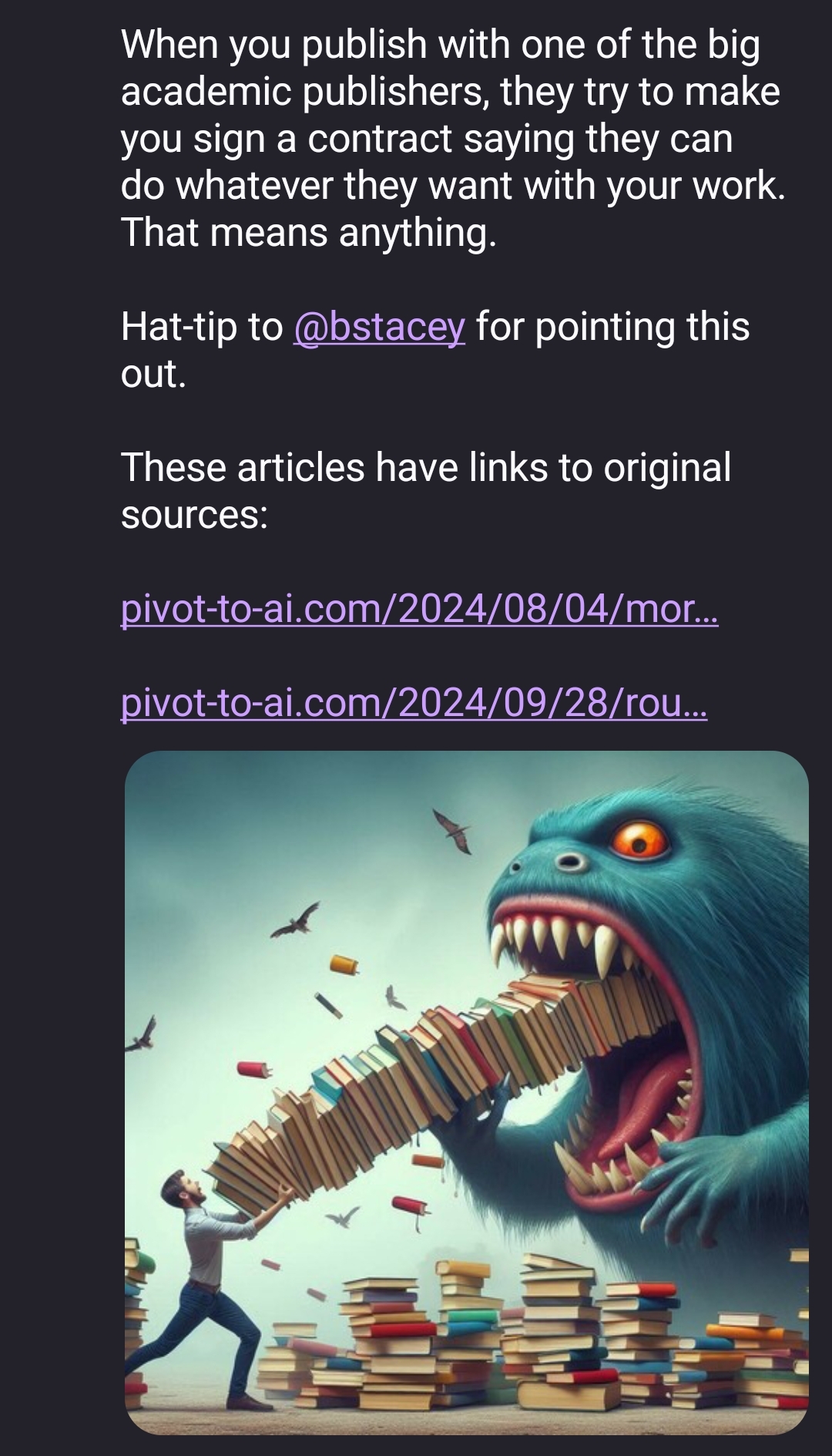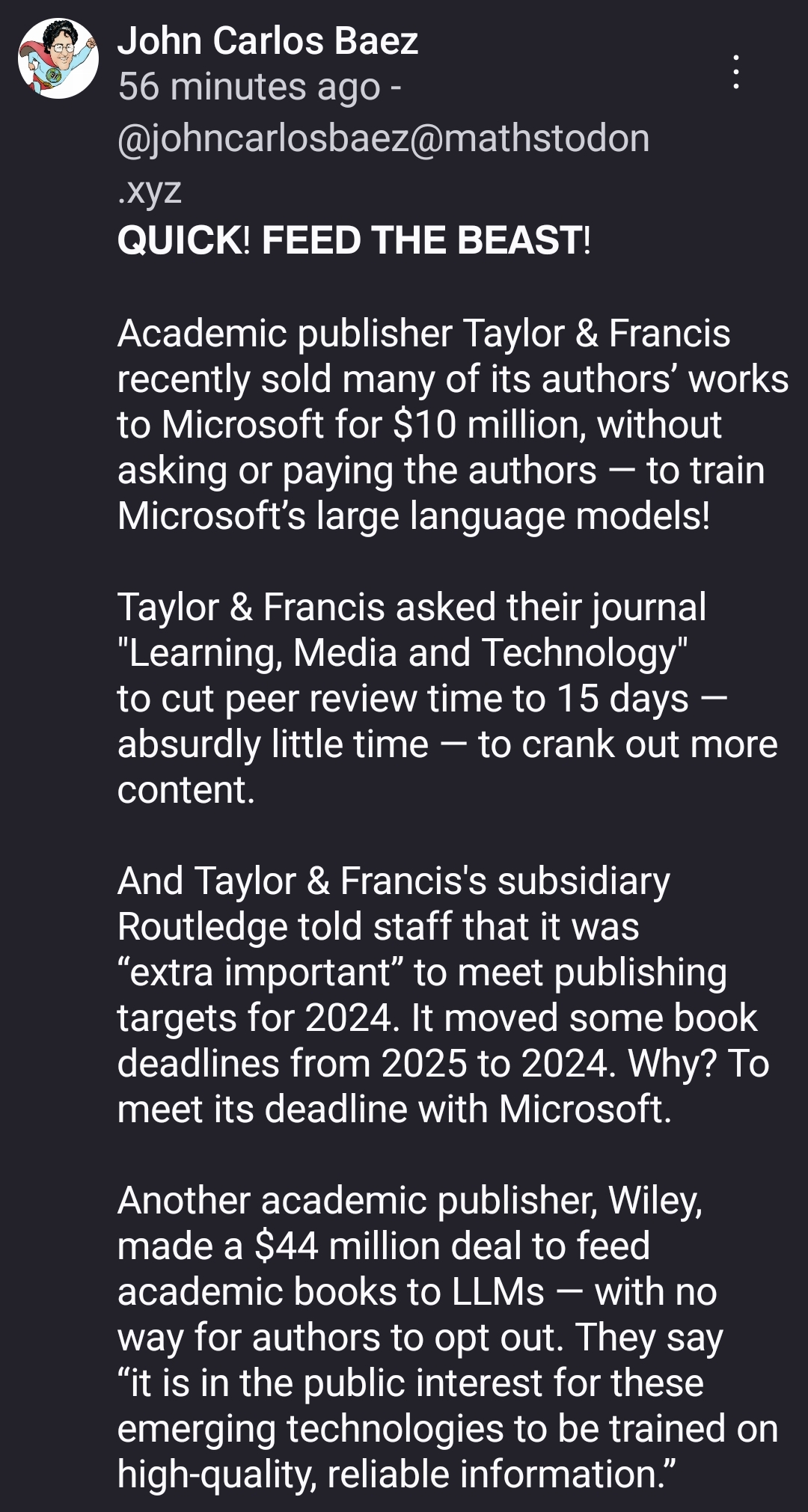this post was submitted on 29 Sep 2024
470 points (97.2% liked)
People Twitter
6914 readers
1522 users here now
People tweeting stuff. We allow tweets from anyone.
RULES:
- Mark NSFW content.
- No doxxing people.
- Must be a pic of the tweet or similar. No direct links to the tweet.
- No bullying or international politcs
- Be excellent to each other.
- Provide an archived link to the tweet (or similar) being shown if it's a major figure or a politician.
founded 2 years ago
MODERATORS
you are viewing a single comment's thread
view the rest of the comments
view the rest of the comments


Thanks for the detailed reply! :P
I'd like to converse with every part of what you pointed out -- real discussions are always exciting!
It's arguably relevant. Researchers pay journals to display their years of work, then these journals resell those years of work to AI companies who send indirect pressure to researchers for more work. It's a form of labor where the pay direction is reversed. Yes, researchers are aware that their papers can be used for profit (like medical tech) but they didn't conceive that it would be sold en masse to ethically dubious, historically copyright-violating, pollution-heavy server farms. Now, I see that you don't agree with this, since you say:
but I can't help but feel obliged to share the following evidence.
I see you also argue that:
And... I partly agree with you on this. As another commenter said, "[AI] is not going back in the bottle", so might as well make it not totally hallucinatory. Of course, this should be done in an ethical way, one that respects the rights to the data of all involved.
But about your next point regarding data usage:
That's a mischaracterization of a lot of views. Yes, a lot of people willfully ignored surveillance capitalism, but we never encouraged it, nor did we ever change our stance from affirmatory to negative because the data we intentionally or inadvertently produced began to be "used for good". One of the earliest surveillance capitalism investigators, Harvard Business School professor Shoshana Zuboff, confirms that we were just scared and uneducated about these things outside of our control.
This kind of thing -- corporate giants giving up thousands of papers to AI -- is another instance of people being scared. But it's not fearmongering. Fearmongering implies that we're making up fright where it doesn't really exist; however, there is indeed an awful, fear-inducing precedent set by this action. Researchers now have to live with the idea that corporations, these vast economic superpowers, can suddenly and easily pivot into using all of their content to fuel AI and make millions. This is the same content they spent years on, that they intended for open use in objectively humanity-supporting manners by peers, the same content they had few alternative options for storage/publishing/hosting other than said publishers. Yes, they signed the ToS and now they're eating it. We're evolving towards the future at breakneck pace -- what's next? they worry, what's next?
(Comment 1/2)
Speaking of fearmongering, you note that:
Ignoring the false equivalency between getting inspiration at an art gallery and feeding millions of artworks into a non-human AI for automated, high-speed, dubious-legality replication and derivation, copyright is how creative workers retain their careers and find incentivization. Your Twitter experiences are anecdotal; in more generalized reality:
The above four points were taken from the Proceedings of the 2023 AIII/ACM Conference on AI, Ethics, and Society (Jiang et al., 2023, section 4.1 and 4.2).
Help me understand your viewpoint. Is copyright nonsensical? Are we hypocrites for worrying about the ways our hosts are using our produced goods? There is a lot of liability and a lot of worry here, but I'm having trouble reconciling: you seem to be implying that this liability and worry are unfounded, but evidence seems to point elsewhere.
Thanks for talking with me! ^ᴗ^
(Comment 2/2)